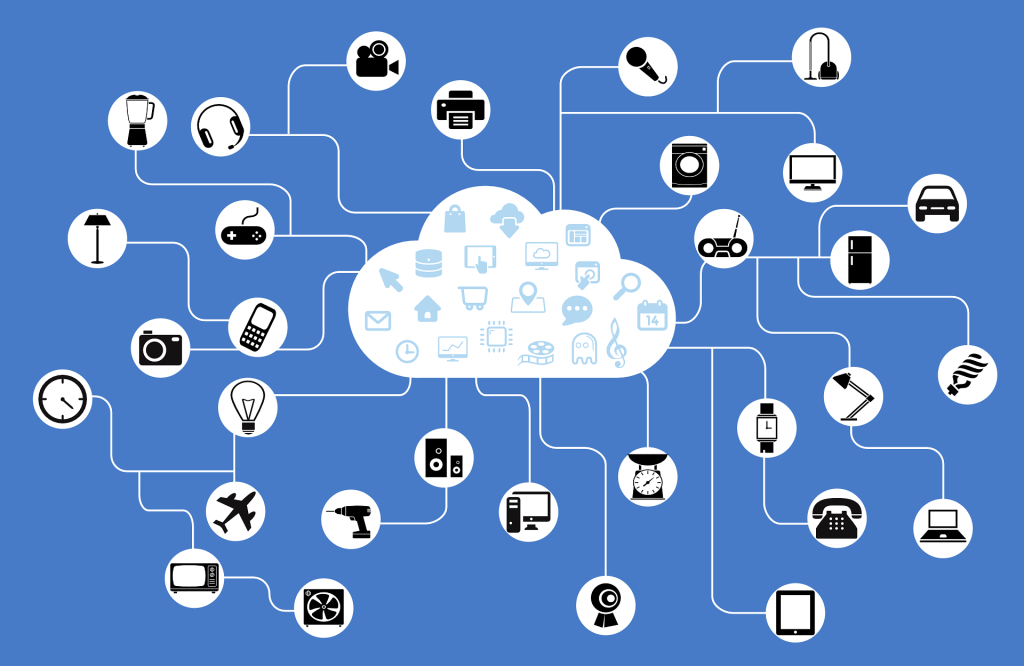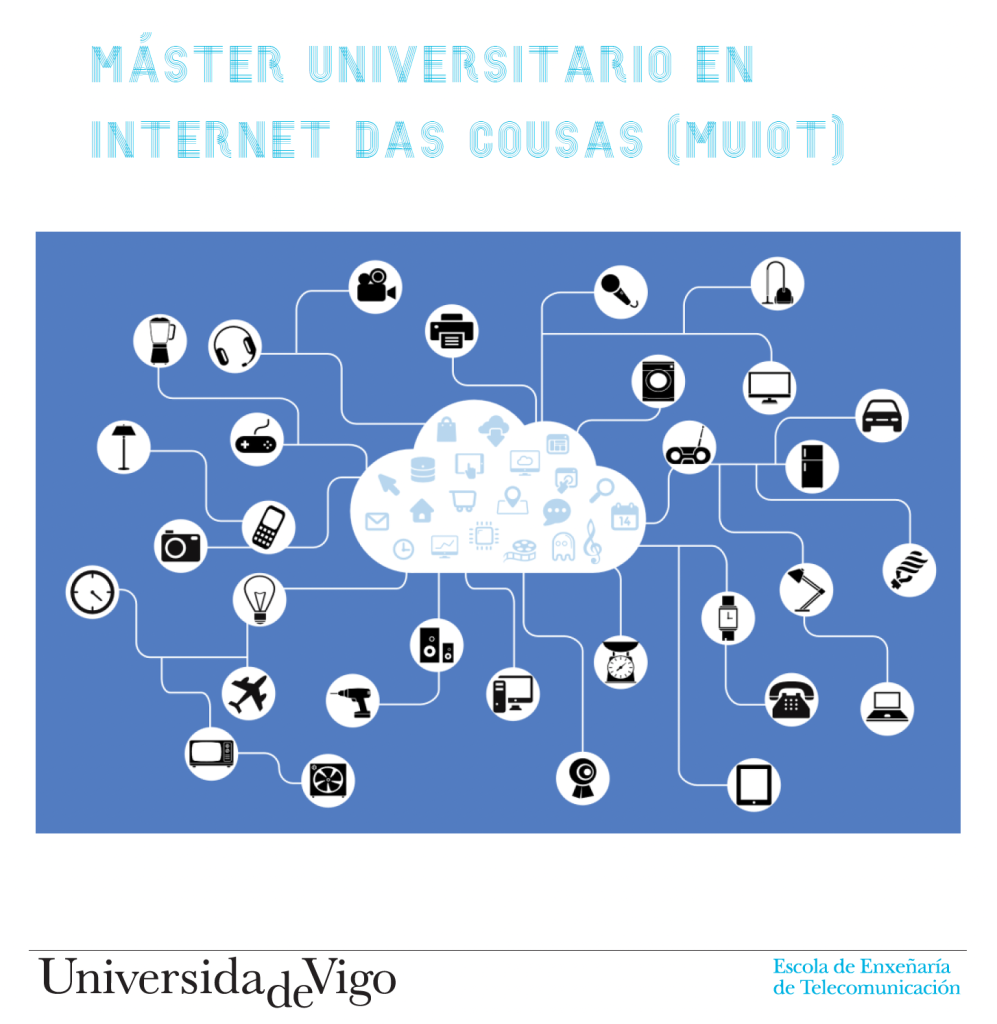In its early days, the Internet enabled global communication between people (email, web, forums, social networks, etc.). However, advancements in wireless communication technologies such as 5G, the miniaturization of devices, and the reduction in costs of sensors, actuators, and electronic components have made it possible to connect everyday objects to the Internet. This has led to the term Internet of Things (IoT), representing a natural and revolutionary extension of connectivity, expanding the Internet’s reach beyond people to the physical world around us.

IoT devices collect environmental data using various types of sensors (temperature, humidity, movement, cameras, microphones, etc.), which are transmitted using various communication technologies, typically wireless, to a storage and processing platform usually located in the cloud. Here, big data analysis and machine learning techniques are employed to extract useful information from the data and act intelligently to monitor, control, and configure the connected devices.
This transformation has led to innovative applications in various fields such as home automation, healthcare, industry, automotive, and smart cities, enhancing quality of life and operational efficiency. Undoubtedly, IoT is one of the fastest-growing technological areas today, and according to various projections, the number of interconnected IoT devices will multiply exponentially in the coming years, creating a significant demand for professionals skilled in this field.
Thus, in the study “Galicia 2030: Future Professional Profiles and New University Degrees and Specializations,” conducted by the Consellería de Educación, Universidade e Formación Profesional from Xunta de Galicia in collaboration with FEUGA, it is highlighted that all consulted sectors, including strategic sectors of Galicia such as automotive, energy, shipbuilding, healthcare, and the textile sector, consider IoT a priority and foresee an increase in the demand for professionals with expertise in IoT.
The Master’s Degree in Internet of Things, jointly proposed by the three public universities in Galicia and considered strategic by the Xunta de Galicia, offers a level of specialization in the IoT field that currently does not exist in the University System of Galicia (SUG).
The master’s program consists of 60 ECTS, divided modularly into four bimester periods, with three specializations (IIoT, Society 5.0, and Connected Vehicle).
Why Study This Degree?
In addition to the growing demand for IoT technology and experts in this field, other highly important characteristics make the training offered in this Master’s program enormously attractive:
- Interdisciplinarity: IoT is a technological discipline that combines knowledge of computer networks, programming, electronics, data analysis, artificial intelligence, and cybersecurity, among others. This allows students to acquire a comprehensive and versatile education, applicable in multiple sectors.
- Innovation and Entrepreneurship: IoT is a constantly evolving field. Studying a master’s in this area provides the opportunity to be at the forefront of technological advancements and potentially develop innovative projects and solutions. Additionally, it is a fertile ground for technological entrepreneurship, given the wide range of applications and the constant need for new solutions.
- Social and Economic Impact: IoT has the potential to transform various industries, allowing IoT professionals to work on highly interesting projects with the potential for positive societal impact and improving people’s quality of life.
In summary, studying this master’s in IoT not only prepares students for one of the most dynamic and promising areas of modern technology but also gives them the opportunity to be agents of change in an increasingly interconnected and technology-dependent world.
Educational Objectives of the Degree
The Master’s Degree in IoT provides students with the necessary knowledge to design, configure, integrate, and maintain digital interconnection systems of objects and people that act autonomously and intelligently, generating useful information for decision-making. The program delves into areas such as embedded systems and IoT devices, IoT architectures, wireless communication technologies, network protocols, cybersecurity, cloud computing, big data processing and analysis, programming, and artificial intelligence.
To address specific problems and solutions in the main application domains where IoT is considered the most important enabling technology, three specializations have been defined:
- Industrial IoT (IIoT): This specialization addresses aspects such as Smart Factories, Industry 4.0, or Green IoT.
- Society 5.0: This specialization delves into various application domains of the so-called Society 5.0, such as the use of IoT systems for Smart Health, Smart Cities, and Smart Buildings and Homes.
- Connected Vehicle: This specialization covers all aspects related to the use of IoT systems for connected vehicles. Specifically, it deals with the application of IoT fundamentals to the connected car, Unmanned Aerial Vehicles (UAVs), and Intelligent Transport Systems (ITS).
Professional Environment
The recommended profile for pursuing the master’s is that of a graduate with a degree or master’s directly related to ICT or Electronics, preferably Telecommunications Engineering, Computer Engineering, and Industrial Engineering. The degree facilitates the incorporation of both recent graduates and experienced professionals in the sector who wish to focus their professional careers on the IoT field. For the latter, part-time enrollment is available to allow them to balance their master’s studies with their professional life.
Graduate Profiles and Career Opportunities
Graduates of the Master’s in IoT will be equipped to design, configure, integrate, and adapt IoT systems applicable to multiple fields, as IoT is transversally applicable in countless areas.
More specifically, graduates of this degree will be able to work as:
- Developers of IoT-based systems, services, and applications
- Home automation experts
- Managers of cutting-edge technology projects
- IoT strategy developers
- IoT consultants
- Data analysts specializing in IoT
- Cybersecurity experts for IoT
- IoT researchers
- IoT solution architects
Additionally, the three proposed specializations will allow for greater depth in one of the three fundamental areas for modern society, training experts in:
- Society 5.0: Experts in applying IoT technologies to fields such as health, smart cities, or smart buildings and homes.
- IIoT: Developers specializing in IoT technologies for Industry 4.0/5.0, including the integration of IIoT systems, the development of digital twins for industrial plants, or the creation of energy-efficient IoT systems.
- Connected Vehicle: Experts in IoT technologies applicable to connected vehicles, intelligent transport systems, or unmanned aerial systems.
Contact
José Carlos López Ardao
Master’s coordinator
teleco.muiot@uvigo.gal
School of Telecommunication Engineering
Campus Lagoas-Marcosende
36310 – Vigo (Pontevedra)

